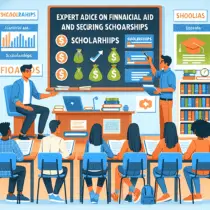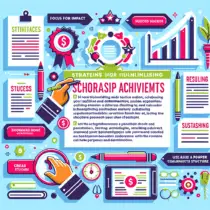Unlocking Financial Aid: Expert Advice on Securing Scholarships
Securing scholarships can be a transformative experience, paving the way for a debt-free education and a brighter future. Scholarships lessen the financial burden on students and their families, making higher education accessible to those who might otherwise be unable to afford it. The process of finding and securing scholarships can be daunting, but with the right approach and resources, anyone can improve their chances of receiving financial aid.
Understanding the Importance of Scholarships
Scholarships are not merely financial aids; they represent recognition of a student’s achievements and potential. Receiving a scholarship often opens doors to academic and professional opportunities that might otherwise remain elusive.
For first-generation college students, scholarships can be particularly empowering. Often, these students face unique challenges, including limited financial resources and lack of familial experience navigating higher education. Empowering Education Access for First-generation College Students through Scholarships can make a significant difference in their academic journeys.
Researching Scholarships: The First Step
One of the first steps in securing scholarships is thorough research. There are countless scholarships available, each with its own set of criteria and application process. Students should start by consulting their school’s guidance counselor or financial aid office, which typically has information on local scholarships.
Online databases such as Fastweb, Scholarship.com, and the College Board’s Scholarship Search are invaluable resources. These platforms allow students to filter scholarships based on their interests, academic achievements, and other criteria.
Tailoring Applications to Stand Out
With so many students vying for scholarships, standing out from the crowd is crucial. Tailoring applications to each scholarship’s specific requirements is key. This begins with carefully reading and understanding the scholarship criteria and then crafting a compelling personal statement that aligns with those requirements.
Students should highlight their unique experiences, achievements, and aspirations. For first-generation college students, sharing their journey, the obstacles they have overcome, and their commitment to education can be particularly compelling.
Securing Letters of Recommendation
Letters of recommendation play a vital role in scholarship applications. These letters provide an external perspective on a student’s abilities and character. It is important to choose recommenders who know the student well and can provide detailed, positive insights.
Approaching teachers, counselors, or other mentors with ample time to write the letter ensures they are not rushed and can produce high-quality recommendations.
Highlighting Academic and Extracurricular Achievements
Academic achievements are a key criterion for many scholarships. Maintaining a strong GPA, excelling in standardized tests, and taking challenging courses all contribute to a strong academic profile. However, extracurricular activities are equally important. Scholarships often look for well-rounded individuals who have demonstrated leadership, community involvement, and passion in their pursuits.
Participating in clubs, sports, volunteer work, or part-time jobs can also demonstrate time-management skills and a commitment to personal growth.
Case Study: The University of Trento International Students PhD Scholarship in Biomolecular Sciences, 2023 – Italy
Let’s consider the University of Trento International Students PhD Scholarship in Biomolecular Sciences, 2023 – Italy. This scholarship is aimed at international students pursuing a PhD in Biomolecular Sciences. Applicants are required to have a solid academic background in relevant scientific disciplines and must demonstrate their research potential and commitment to the field.
To secure this scholarship, applicants should focus on presenting a strong research proposal that aligns with the university’s specialties. They should also obtain recommendation letters from academic professionals who can attest to their research capabilities and potential contributions to the field of biomolecular sciences.
Crafting a Strong Personal Statement
A well-crafted personal statement can make a significant difference in a scholarship application. It should provide a narrative that connects the student’s past experiences with their future goals. The statement should be personal and reflective, offering insights into the student’s character and motivation.
Applicants should avoid generic statements and instead focus on specifics, such as particular challenges they have overcome, specific achievements, and clear, realistic goals for the future.
Managing Deadlines and Requirements
Organizational skills are crucial in the scholarship application process. Keeping track of deadlines, required documents, and application statuses can prevent last-minute stress and ensure nothing is overlooked.
Creating a spreadsheet or checklist can help manage multiple applications. Students should prioritize scholarships based on their eligibility and the award amount and ensure they have ample time to prepare a quality application for each one.
Financial Aid Offices and Resources
Most colleges and universities have dedicated financial aid offices to assist students with securing scholarships and other forms of financial aid. These offices are invaluable resources that can provide guidance on available scholarships and the application process.
In addition, many educational institutions offer workshops and seminars on financial aid and scholarship application strategies. Attending these can provide insights and tips from experts that can improve a student’s chances of securing scholarships.
Online Scholarship Search Engines
Numerous online platforms exist to help students find scholarships. These search engines can filter scholarships based on various criteria, making it easier to find ones that match the student’s profile. Websites such as Cappex, Chegg Scholarships, and Peterson’s provide comprehensive databases of scholarships and useful tips for securing them.
External Scholarship Programs
Apart from scholarships offered by educational institutions, there are many external scholarship programs funded by governments, non-profit organizations, and private companies. For instance, the Gates Millennium Scholars Program offers significant financial aid to outstanding minority students, covering the full cost of attendance.
Students should also explore professional associations related to their intended field of study, as many offer scholarships or grants to support the next generation of professionals.
The Role of Essays in Scholarship Applications
Scholarship essays are a common requirement and an excellent opportunity for students to showcase their writing skills, personality, and passion. When writing these essays, it is essential to respond directly to the prompt, use clear and concise language, and provide personal anecdotes that illustrate key points.
Proofreading is also crucial. Spelling and grammatical errors can detract from an otherwise strong application. Having a teacher, mentor, or family member review the essay can provide valuable feedback.
Utilizing Community Resources
Local community organizations can also be a valuable source of scholarship opportunities. Many community foundations, rotary clubs, and other local groups offer scholarships to residents.
Moreover, religious organizations, local businesses, and civic groups often provide scholarships to support the education of young members or residents. Students should leverage these community connections to identify additional funding opportunities.
Leveraging Social Media and Networking
In today’s digital age, social media and networking can play a role in discovering scholarships. Following scholarship organizations, educational institutions, and professional associations on platforms like LinkedIn, Facebook, and Twitter can provide timely information on new opportunities.
Additionally, networking with peers, teachers, and mentors can lead to learning about lesser-known scholarships and receiving valuable advice on the application process.
Conclusion
Securing scholarships requires dedication, organization, and a proactive approach. The rewards of securing financial aid are immense, offering not just monetary support, but also validation of a student’s hard work and potential.
From local community-based scholarships to opportunities like the University of Trento International Students PhD Scholarship in Biomolecular Sciences, 2023 – Italy, there are numerous options available to students. By empowering education access for first-generation college students through scholarships, we can help build a more inclusive and educated society.
Determined students who leverage available resources, tailor their applications thoughtfully, and manage the process effectively, can unlock the financial aid they need to pursue their educational dreams. The journey might be rigorous, but the rewards are well worth the effort.






